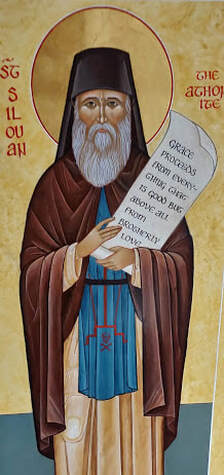'Lord,' said Silouan, 'teach me what I must do that my soul may become humble.' Love of Enemies and Facing Hell
Saint Silouan was born Simeon Ivanovich Antonov in 1866 to Russian Orthodox parents who came from the village of Sovsk in Russia's Tambov region. At the age of twenty-seven he left his native Russia and came to Mount Athos, where he became a monk at the Monastery of St. Panteleimon and was given the name Silouan, the Russian version of the Biblical name Silvanus. CLICK HERE TO READ "Suffering and Joy: Why St. Silouan is Our Patron Saint?" An ardent ascetic, he received the grace of unceasing prayer and saw Christ in a vision. After long years of spiritual trial, he acquired great humility and inner stillness. He prayed and wept for the whole world as for himself, and he put the highest value on love for enemies. Thomas Merton, a twentieth-century Catholic monk, described Silouan as “the most authentic monk of the twentieth century.” St Silouan died on September 24, 1938. He was glorified by the Ecumenical Patriarchate in 1987. Though barely literate, he was sought out by pilgrims for his wise counsel. St. Nikolaj Velimirović was one such pilgrim. His writings were edited by his disciple and pupil, Archimandrite Sophrony. Father Sophrony has written the life of the saint along with a record of St. Silouan's teachings in the book Saint Silouan the Athonite. Although it is natural and usual to love those who love us and to do good to those who do good to us (Mt 5:46-47; Lk 6:32-33), to love our enemies is distasteful to our nature. One can say that it isn't in our power but is an attitude that can only be the fruit of grace, given by the Holy Spirit. This is why St. Silouan the Athonite writes, "The soul that has not known the Holy Spirit does not understand how one can love one's enemies, and does not accept it." The Staretz repeatedly says that love of enemies is impossible without grace: "Lord, You have given the commandment to love enemies, but this is difficult for us sinners if Your grace is not with us"; "Without God's grace we cannot love enemies"; "He who does not love his enemies, does not have God's grace"; "He who has not learned to love from the Holy Spirit, will certainly not pray for his enemies." On the contrary, St. Silouan always teaches that this attitude is a gift of the Holy Spirit: "The Lord has commanded us to love our enemies, and the Holy Spirit reveals this love to us"; "One can only love one's enemies through the grace of the Holy Spirit"; "When you will love your enemies, know that a great divine grace will be living in you." The Staretz would say that for Christ there are no enemies -- there are those who accept "the words of eternal life," there are those who reject and even crucify; but for the Creator of every living thing, there can be no enemy. So it should be for the Christian, too, who "in pity for all must strive for the salvation of all." Source: Orthodox Peace Fellowship |
Apolytikion/Troparion
By prayer you did receive Christ as your teacher in the way of humility; and the Spirit bore witness to salvation in your heart; wherefore all peoples called unto hope rejoice this day of your memory. O sacred Father Silouan, pray unto Christ our God for the salvation of our souls. Kontakion During your life on earth you did serve Christ following his path; and now in heaven you do contemplate him whom you have loved, dwelling with Him according to the promise here below. Wherefore, O Father Silouan, teach us the way you have gone. Lord, as you prayed for your enemies, so teach us also, through the Holy Spirit, to love our enemies - St Silouan |
Those who dislike and reject their fellow-man are impoverished in their being. They do not know the true God, who is all-embracing love. -St Silouan
A video of Metropolitan Anthony Bloom speaking about St Silouan the Athonite posted by masarchive.org.

